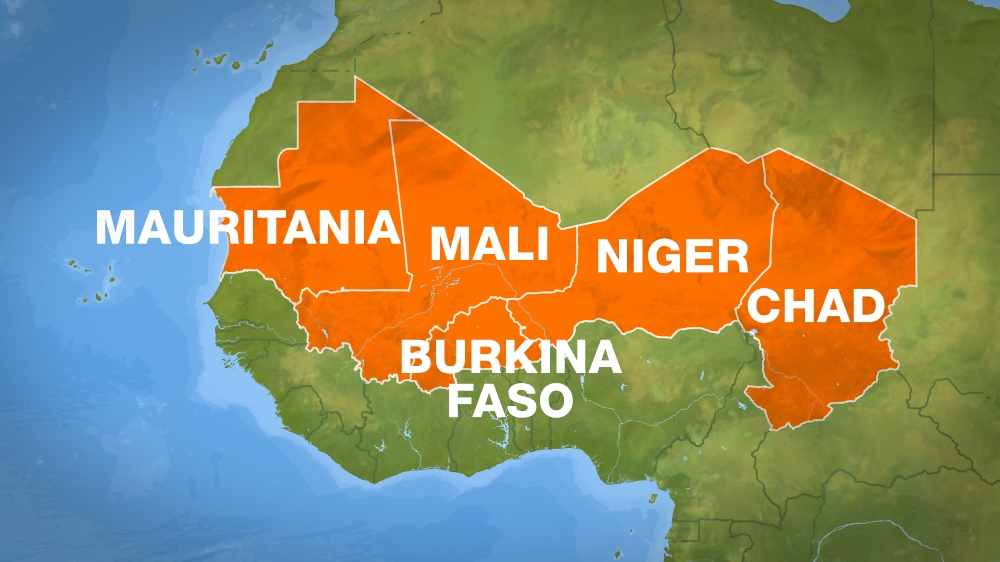West African and French leaders launch Sahel force
New force, meant to be operational soon, will be deployed in the region along with a 12,000-strong UN mission in Mali.

Five African countries have launched a new multinational force to fight armed groups in the Sahel region, which France’s President Emmanuel Macron told a summit in Mali should be fully operational “in a matter of weeks”.
The new regional anti-terror force is set to include as many as 5,000 soldiers, with one battalion from each of the so-called G5 Sahel countries: Mali, Mauritania, Burkina Faso, Niger and Chad.
“Our enemies are cowards, but they have determination. They want to destroy us,” Macron said on Sunday, in a regional summit with the G5-Sahel leaders in the Malian capital, Bamako.
France’s president said his country would contribute $9m to the new force this year. He also mentioned a contribution of 70 vehicles, without saying whether that was included in the sum.
READ MORE: Mali’s Keita vows to keep fighting ‘terrorist groups’
The European Union has also pledged $57m towards the new force, and France is seeking additional financing from partners, including Germany and the United States.
The new force will operate in the region along with the 12,000-strong UN peacekeeping mission and the 5,000-strong French troops already in Mali, which obtained its independence from France in 1960.
In addition, Macron announced $228m in development aid to the Sahel region over the next five years.
“We cannot hide behind words, and must take actions,” he said.

Speaking at the same event, Malian President Ibrahim Boubacar Keita described al-Qaeda-linked fighters in the Sahel as “without face and with no ethics”.
“They do not share our values,” Keita said.
The fight against armed fighters is expected to focus on the border area between Mali, Niger and Burkina Faso, where attacks against military barracks have occurred recently.
A French military intervention in January 2013 turned back a separatist movement in Mali’s north, but various armed groups still stage attacks.
![There are at least 12,000 UN peacekeeping troops and 5,000 French troops in Mali [Joe Penney/Reuters]](/wp-content/uploads/2017/07/adcd73abaed34e83a3d5ea76c7327d67_18.jpeg)
Key challenges
Macron’s visit comes as al-Qaeda’s Mali branch released a proof-of-life video of six foreign hostages, including a French woman who was abducted in late 2016 in the northern Malian town of Gao.
On Sunday, Macron denounced the abduction of Sophie Petronin, vowing that his government will “put all our energy towards eradicating” the armed groups involved in the abduction.
Al Jazeera’s Mohamed Vall, reporting from Bamako, said financing remains the crucial issue for the operations across the Sahel.
“There are troops here and they’ve been trying to solve the problem of insecurity in the region, but they haven’t been successful because the funding is at the heart of this situation,” he said, adding that lack of money could cause the new initiative to fail.
|
|
“The United Nations is struggling now with the approach of the US that the UN should reduce its security budget around the world,” Vall said.
“That US approach is touching this region.”
Meanwhile, analysts said internal conflicts within Mali are complicating the fight against the armed groups.
“What we see is a big focus on military, on equipment, on institutions that they are going to establish,” Marie Roger Biloa, editor of the Paris-based Africa International, told Al Jazeera.
She said, however, that so far it has proved difficult to bring troops from different countries to effectively work together, and called for increased political efforts to address Mali’s “very complicated” situation.
“The problem is that France wants to fight terror – because terrorism is striking on French soil but also abroad – but they fail to realise or to take into consideration that Mali, which is the heart of the problem, is having internal problems to solve,” she said.
“If you want to be efficient you also have to address that issue.”
In 2015, an alliance of Tuareg-led rebels and Mali’s government signed a peace deal brokered by Algeria. The deal hands the Tuaregs greater autonomy of the northern region of Mali, in a bid to end a cycle of violence.
Since then, there has been sporadic fighting between pro-government militia and the coalition of Tuareg rebels, also known as the Coordination of Movements for Azawad.
“You have a political situation with the Azawad pro-independence rebels who did not really sign the peace agreement – they just initialed this, they refused to sign it. But you have a huge gap of trust between the government and the rebels,” Biloa told Al Jazeera.
Mali has seen a series of attacks in recent months, including a deadly raid of a tourist resort in Bamako in mid-June.
More than 100 UN soldiers have also died in recent months, making it the most deadly UN mission to date.
|
|